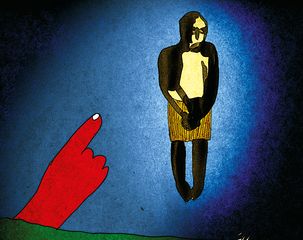One of the more productive moments of the monsoon session of Parliament was the passing of the Trafficking of Persons (Prevention, Protection and Rehabilitation) Bill, 2018, better known as the Human Trafficking Bill, by the Lok Sabha on July 26. The bill, for the first time in India, makes buying and selling of human beings a cognisable offence. And it provides for the prevention, rescue, and rehabilitation of trafficked persons.
Human trafficking can be understood as the recruitment, sheltering or transportation of a person by intimidation, cajolement or force for purposes of extreme exploitation, involving sex trade, forced labour, slavery and organ harvesting.
Human trafficking is a hidden crime, hence it is difficult to get accurate statistics on it. Yet, researchers estimate that approximately 70 to 80 per cent of human trafficking across the world is for sex trade, followed by trafficking for the purpose of forced labour, and for organ harvesting for illegal transplant. Of the victims trafficked for sex trade, nearly 80 per cent are reportedly female and 50 per cent of them are children.
Human trafficking, though heavily loaded against females, earns the unique distinction of being a transnational crime in which women are significantly represented across its dimensions—as victims, as perpetrators, as facilitators across the supply chain, and as activists fighting against this crime.
Human trafficking, because of absence of a specific and effective law to check it, has proliferated as one of the fastest growing criminal enterprises in India. As it holds relatively low risk with high profit potential, criminal organisations are increasingly attracted to this trade. The fact that humans can be sold repeatedly, unlike drugs, makes the trade more profitable.
The new bill, if it becomes an Act, would provide for a jail term of at least a year and a fine of Rs 1 lakh for those who abet trafficking or fail to protect a victim; seven years and Rs 2 lakh fine for the owner or manager of a property that has been used for the crime; life imprisonment for repeat offenders and confiscation of the property found to be involved in the crime. Besides, the bill also provides for special courts and dedicated police units, making the National Investigation Agency (NIA) the nodal authority for probing cases of human trafficking through a proposed amendment to the NIA Act. Also, there would be designated courts in each district for speedy trial of the cases.
Although, the bill does not intend to victimise adults engaged voluntarily in sex work, if implemented, it would work as a strong deterrent against illegal human trafficking networks in the infamous red-light areas of big metros, such as GB Road and Kamathipura, as any property found to be engaged in the act in these hubs would invite the confiscation clause.
The most heartwarming aspect of this bill is the rehabilitation clause, under which a fund is proposed to be created for the physical, psychological and social wellbeing of the victims, and for facilitating their rehabilitation in the societal mainstream.
However, in order to make any rehabilitation effort successful, the wider involvement of society is a must. Therefore, government agencies, in tandem with the civil society, need to run effective social campaigns towards sensitising the wider community for accepting the victims as normal members of society.
With these provisions in place, and the bill becoming an Act, it would go a long way in checking the scourge of human trafficking in India and in ensuring that no child or adult is denied his or her fundamental life to freedom and liberty. It aims to ensure the lofty ideal that human are persons, not possessions.
Lekhi is member of Parliament • forthwriteml@gmail.com


